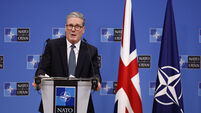John Whelan: Business leaders want the threats to the protocol to stop

Trucks at Larne Port in Co Antrim; continuous threats to renegotiate the Brexit deal for the region is the biggest worry for business leaders in Belfast. Picture: Brian Lawless
The British government's plans to move ahead with draft legislation to do away with sections of the Northern Ireland Protocol, including the checks on goods entering the North from the EU under the Brexit trade deal, has raised concerns in Dublin, Brussels, and Washington.
In Dublin last week, British Labour Party leader Keir Starmer accused British prime minister Boris Johnson of taking a “wrecking ball” to Britain's relationships with Ireland and the EU with the controversial plan to unilaterally scrap parts of the protocol.















